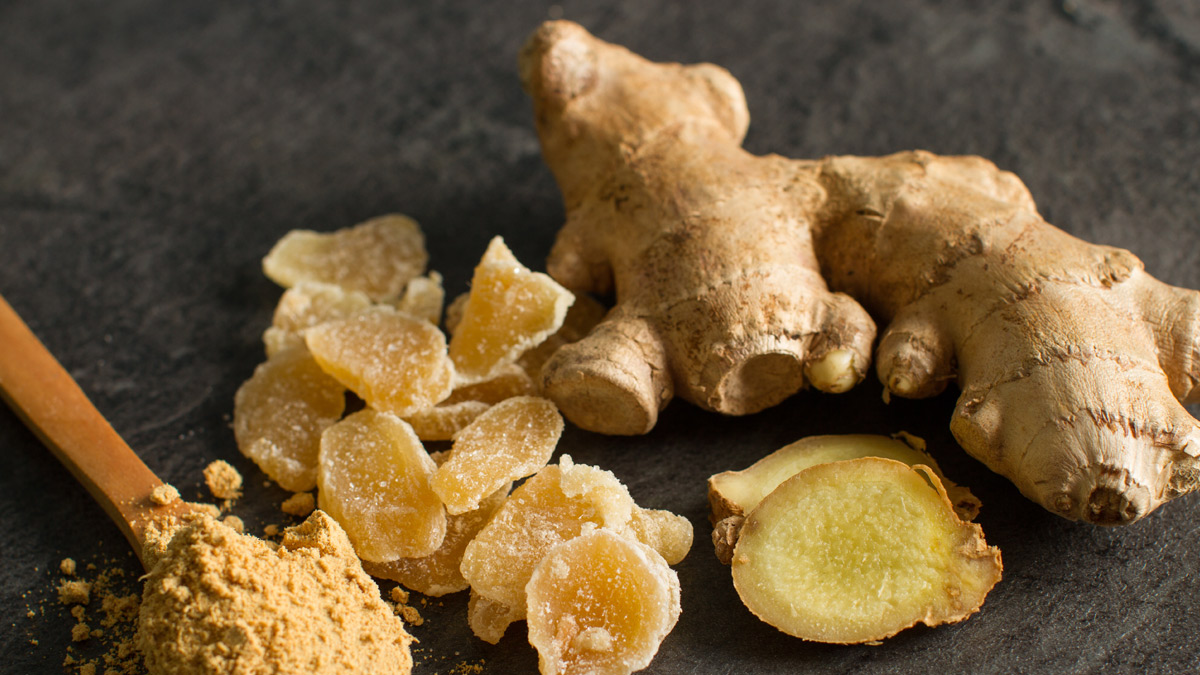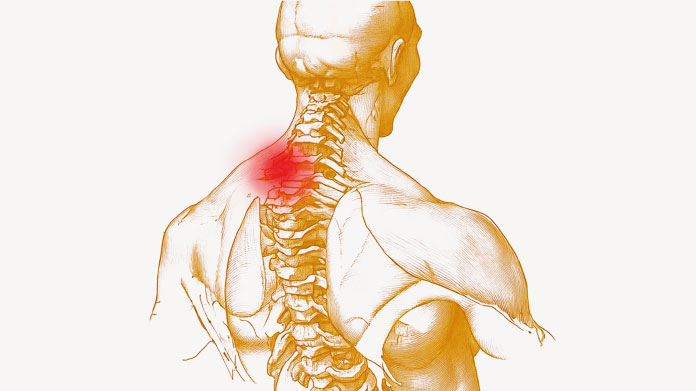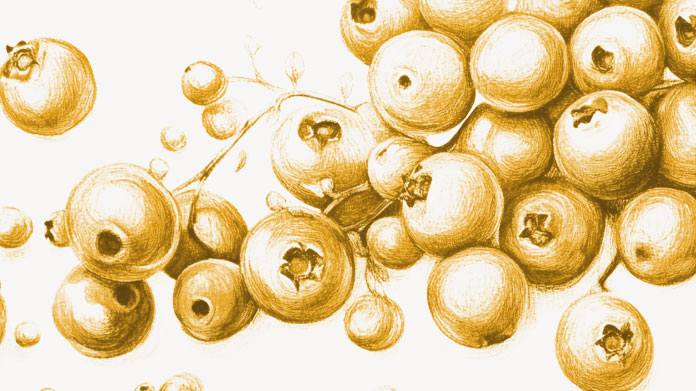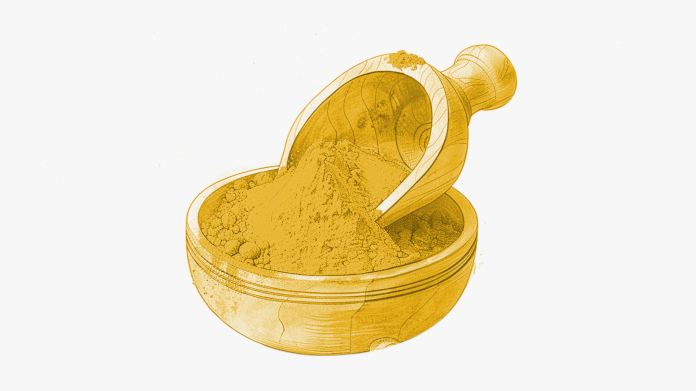5 good reasons to consume ginger
Even if the supposed aphrodisiac effects of ginger have yet to be scientifically proven, this Asian spice nonetheless offers a surprising number of health benefits, as demonstrated in close to 100 clinical trials.

Ginger for good digestion
Gingerol, the phenol compound responsible for ginger’s pungent flavor, facilitates digestion by stimulating production of bile and digestive enzymes. This active principle from the vanilloid family makes up over 15% of the fresh ginger juice extracted from the root and isolated during the manufacture of the ginger extract used in Inflarelief Formula capsules. This active principle accelerates gastric emptying, stimulates pancreatic secretions and reduces the leaden feeling in the stomach following a heavy meal. Gingerol also prevents dyspepsia, a collection of symptoms caused by epigastric discomfort which is also responsible for abdominal bloating and gas.
Ginger for reducing severity of nausea
In 1999, the World Health Organization recognised the benefits of ginger root for treating morning sickness during the first trimester of pregnancy. The shogaol present in ginger’s underground stem has properties which are chemically similar to gingerol and plays a key role in this anti-nausea effect by reducing churning in the stomach. The ginger root extract used in phytotherapy and prescribed to pregnant women can be an effective substitute for vitamin B6 pyridoxamine and is free from side-effects.
Conducted in 2005 by a team of five Italian researchers, a systematic literature review of clinical trials entitled Effectiveness and safety of ginger in the treatment of pregnancy-induced nausea and vomiting, also confirmed the benefits of ginger root for pregnancy-related sickness. Involving a total of 675 participants, the studies included in the review showed that consuming between 0.5g and 1.5g of ginger powder a day in capsule form was effective.
Ginger for relieving arthritic pain
The anti-inflammatory and anti-bacterial properties of ginger are used in traditional Chinese medicine to relieve rheumatic pain related to various types of arthritis. The arthritic pain-relief benefits of several of ginger’s constituents, including 6-Gingerol and 10-Gingerol, were the object of a scientific study published in the journal Arthritis and Rheumatism in 2012. This double-blind, randomized, controlled trial, conducted in accordance with Evidence-Based Medicine (EBM) criteria, demonstrated that the salicylates in ginger also relieve the pain and discomfort of joint problems. The salicylates are converted by the body into salicylic acid (aspirin), to prevent the production from unsaturated fatty acids of prostaglandins, central mediators of inflammation and pain. Ginger extract-based dietary supplements may therefore be as effective as non-steroidal anti-inflammatory drugs (NSAIDs) such as ibuprofen, but without the latter’s unwelcome side-effects.
Ginger for reducing muscle pain
The results of an American clinical trial published in the Journal of Pain in September 2010, demonstrated the benefits of ginger extract-based dietary supplements in 74 sportspeople with moderate muscle pain following intense physical exercise. Those who consumed 2g a day of ginger extract for 11 days experienced a 25% reduction in pain compared with a placebo group. Two types of preparation were tested: extract of raw ginger, and extract of heat-treated ginger, dried before encapsulation. Both displayed the same anti-inflammatory effects as aspirin, paracetamol and ibuprofen, as a result of their phenol compounds, gingerol and shogaol. The dietary supplement with heat-treated ginger extract contained less gingerol and more shogaol, levels of which increase when subjected to heat.
Ginger: proven therapeutic indications
Ginger has vasodilatory properties which help reduce levels of ‘bad’ cholesterol in the blood and lower the risk of cardiovascular disease. A double-blind controlled study conducted in 2004 in two clinics in Iran, and published in 2008, demonstrated the efficacy of ginger powder in 85 participants with a lipid profile displaying raised LDL-cholesterol. The subjects consumed 3g of ginger powder a day for 45 days.
Ginger’s anti-cancer properties are well-documented in a study conducted by American scientists, published in theBritish Journal of Nutrition in 2011. Taking 100mg of ginger extract per kg/bodyweight was shown to have disrupted the development of cancer cells more rapidly than chemotherapy in 56% of the prostate cancer patients surveyed. Ginger’s active constituents may also be able to impede the growth of ovarian tumours, according to a study published in the Revue de la Médecine Contemporaine. However, early treatment, in combination with chemotherapy, is essential to halt angiogenesis as quickly as possible so the cancer can be more easily treated.
Ginger also delays aging of the body’s cells. Its antioxidant properties are primarily due to its high manganese content which helps prevent free radical damage, strongly implicated in the development of cardiovascular disease and certain cancers. Ginger may also contain around 40 antioxidant active principles the efficacy of which is enhanced by heat. Heat-treated ginger is thus recommended for combatting cellular aging.
Not only does ginger add sophistication to cooking with its fresh flavours, but it also provides relief from various health problems when ingested in the form of capsules. Ginger extract-based dietary supplements offer revitalising, anti-inflammatory, neuro-protective and antioxidant effects.
Keywords
1 Days
First bottle has been finished
First bottle has been finished. 2 bottles remaining for 3 month time frame trial as recommended
CORCORAN Pamela
6 Days
repeat customer
recommended by my doctor. easy to create an account. Discounts and specials are appreciated. packaging and delivery is dependable. Capsules easy to digest. I've had some some capsules and tablets that are broken inside their bottles.
Kokee
10 Days
Order was shipped on time and packaged…Wonderful Jobs!
Order was shipped on time and packaged excellently.
DMHoge
17 Days
great products and prices
great products and prices
Marie
22 Days
Easy to navigate site
Easy to navigate site, had what I was searching for, good price. easy order-check out
James Tucker
29 Days
My skin is clearing up nicely!
Pretty good for my skin so far.
Christian
31 Days
The new packaging is excellent
The new packaging is excellent - finally! No more squashed boxes and torn envelopes.
GORAN
32 Days
Great Product
Great Product
Larry Garrett
36 Days
Quick shipping
Quick shipping; good price. No issues!
Mary McCarty
37 Days
Thr product is very good and is helping…
Thr product is very good and is helping me on my health. Then is always on time
LUGO Luz
40 Days
Buying was fine
Buying was fine. I had problems with the website not recognizing my login info, and had to call to get it fixed. Other than that, everything was good.
David S. Clark
40 Days
Your super maca and super ginseng are…phenomenal
Your super maca and super ginseng are phenomenal supplements that compliment each other when taking them together. Fantastic feeling of well-being and lots of mid day energy without the crash.
Keith Mason
43 Days
I have had amazing results with every…
I have had amazing results with every supplement I've purchased. I am extremely satisfied with this company
kirstin Torres
43 Days
Fine products
Fine products . They are on the leading edge of online supplements. The only issue -so far-is they sometime run out of subscription items.
Jason Argos
46 Days
The ordering process is very user…
The ordering process is very user friendly and the products always come in a timely manner.
CARTER Rhonda




